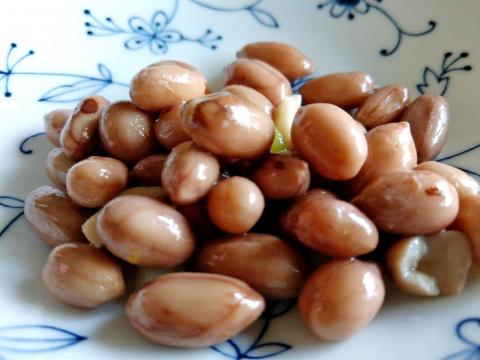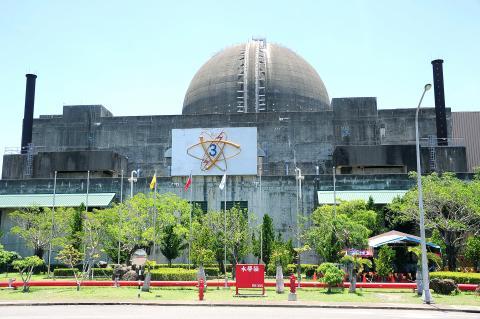After three children in Kaohsiung nearly died, doctors advised that foods such as peanuts, melon seeds and nuts should be cut into pieces before feeding to children to avoid choking.
Hsu Mei-hsin (徐美欣), a doctor at Kaohsiung Chang Gung Memorial Hospital’s pediatric intensive care unit (PICU), on Sunday said the hospital has recently treated three children who developed acute respiratory distress because of peanuts stuck in their airways.
All three patients had to undergo surgery to remove the foreign bodies, Hsu said.

Photo: Fang Chih-hsien, Taipei Times
PICU director Kuo Hsuan-chang (郭玄章) said that in the first case, a peanut accidentally entered the trachea and obstructed the passageway of a three-year-old, who then had trouble breathing.
The child was rushed to the hospital, and an emergency tracheal intubation was performed, but the child had already gone into cardiac arrest, he said.
The peanut in the trachea then broke into two pieces and fell into the right main bronchial tube, causing the right lung to collapse. During surgery, other pieces entered the main bronchial tube again, causing the left lung to collapse as well, Kuo said.
All the peanut pieces were removed eventually, but the patient went into a vegetative state due to a lack of oxygen to the brain, he said.
Hsu said that in the other two cases, peanuts went down the trachea and also entered the bronchial tubes.
In the second case, a five-year-old ate peanuts while his parents were not watching, and then began to experience difficult and rapid breathing. Suspecting that it might be an asthma attack, the parents brought the child to the hospital for asthma treatment, but to no avail, she said.
It was only upon further examination that a peanut was found lodged in the bronchial tube. Because it passed the trachea and entered the bronchial tube, the patient was able to continue to breathe, although with difficulty, Hsu said.
In the third case, a peanut was lodged in the bronchial tube of a one-year-old, who soon showed symptoms resembling an asthma attack, she said.
Doctors responded quickly and removed all the peanut pieces after the parents mentioned that the child had been eating peanuts, she said.
However, some broken pieces at the bottom of the lungs had already caused an inflammation of the bronchial tube, requiring further observation at the ICU before the child could return home, she added.
Hsu said peanuts are the most common cause of children choking, while melon seeds, melon seed shells and nuts are also common culprits. She added that a child’s trachea is about the size of a peanut.
As peanuts break easily, some pieces might break off during surgery and find their way to the lungs, causing difficulty breathing and pneumonia, she said.
Pediatric intensive care department director Lin Ing-jui (林盈瑞) said that foreign objects enter young children’s tracheas more easily due to their limited chewing and swallowing abilities.
Parents should be aware that something might be blocking the child’s airway when they experience symptoms similar to asthma that do not improve after taking asthma medications, Lin said.
People should keep foods of this type out of children’s reach, he said, adding that cutting these foods into small pieces before consumption would be a safer approach.

A fugitive in a suspected cosmetic surgery fraud case today returned to Taiwan from Canada, after being wanted for six years. Internet celebrity Su Chen-tuan (蘇陳端), known as Lady Nai Nai (貴婦奈奈), and her former boyfriend, plastic surgeon Paul Huang (黃博健), allegedly defrauded clients and friends of about NT$1 billion (US$30.66 million). Su was put on a wanted list in 2019 when she lived in Toronto, Canada, after failing to respond to subpoenas and arrest warrants from the Taipei District Prosecutors’ Office. Su arrived at Taiwan Taoyuan International Airport at 5am today on an EVA Air flight accompanied by a

An essay competition jointly organized by a local writing society and a publisher affiliated with the Chinese Communist Party (CCP) might have contravened the Act Governing Relations Between the People of the Taiwan Area and the Mainland Area (臺灣地區與大陸地區人民關係條例), the Mainland Affairs Council (MAC) said on Thursday. “In this case, the partner organization is clearly an agency under the CCP’s Fujian Provincial Committee,” MAC Deputy Minister and spokesperson Liang Wen-chieh (梁文傑) said at a news briefing in Taipei. “It also involves bringing Taiwanese students to China with all-expenses-paid arrangements to attend award ceremonies and camps,” Liang said. Those two “characteristics” are typically sufficient

A magnitude 5.9 earthquake that struck about 33km off the coast of Hualien City was the "main shock" in a series of quakes in the area, with aftershocks expected over the next three days, the Central Weather Administration (CWA) said yesterday. Prior to the magnitude 5.9 quake shaking most of Taiwan at 6:53pm yesterday, six other earthquakes stronger than a magnitude of 4, starting with a magnitude 5.5 quake at 6:09pm, occurred in the area. CWA Seismological Center Director Wu Chien-fu (吳健富) confirmed that the quakes were all part of the same series and that the magnitude 5.5 temblor was

Restarting the No. 2 reactor at the Ma-anshan Nuclear Power Plant would take up to 18 months, Minister of Economic Affairs J.W. Kuo (郭智輝) said today. Kuo was answering questions during a meeting of the Legislative Yuan’s Economics Committee, where legislators are considering amendments to the Renewable Energy Development Act (再生能源發展條) amid concerns about the consequences of the Pingtung County reactor’s decommissioning scheduled for May 17. Its decommissioning is to mark the end of Taiwan’s nuclear power production. However, Chinese Nationalist Party (KMT) lawmakers have proposed an amendment to the Nuclear Reactor Facilities Regulation Act (核子反應器設施管制法) that would extend the life of existing